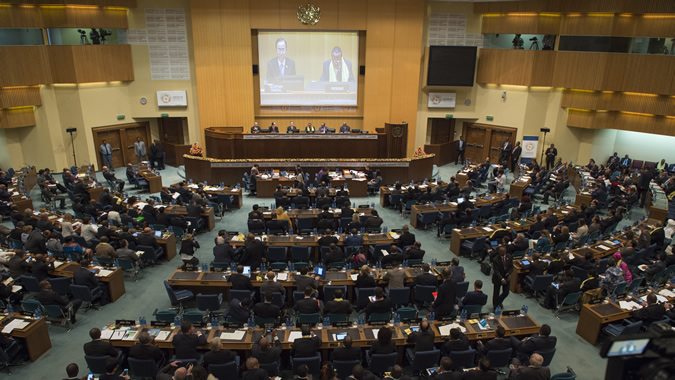Alicia Bárcena Advocates Boosting Domestic Resources to Finance Development
ECLAC’s Executive Secretary participated in a roundtable in the framework of the Third International Conference on Financing for Development in Addis Ababa.

The Executive Secretary of the Economic Commission for Latin America and the Caribbean (ECLAC), Alicia Bárcena, today in Addis Ababa advocated boosting the mobilization of countries’ domestic resources to finance their development versus relying on flows that depend on external sources, such as Foreign Direct Investment (FDI) or Official Development Assistance (ODA).
The senior United Nations official spoke at a roundtable dedicated to analyzing policy coherence to ensure sustainable development, in the framework of the Third International Conference on Financing for Development, which is being held from July 13 to July 16 in Addis Ababa, Ethiopia. At this meeting, participants are expected to agree upon an action plan on this matter that will pave the way for the adoption and implementation of the post-2015 agenda, which will be approved in September in New York.
“Development must be generated from within countries,” ECLAC’s Executive Secretary indicated, adding that the domestic mobilization of resources strengthens sovereignty in decision-making. To achieve this, she said that long-term national planning is needed along with increased tax collection via a progressive fiscal structure.
Alicia Bárcena recalled that inequality is the main structural problem in Latin America and the Caribbean. “We need a paradigm shift that takes us from the culture of privilege to that of equality, with a new equation between the State, the market and society,” achieved through compacts between different actors on areas that are key to development, which includes fiscal matters, she said.
Regarding external flows, Alicia Bárcena explained that ODA is no longer an option for Latin America and the Caribbean, since the majority of States in the region are considered to be middle-income. In terms of FDI, it is very concentrated in a few countries and in extractive sectors that generate little employment or knowledge transfer. As an example, she indicated that one million dollars of investment in mining translates into just one new job.
ECLAC’s most senior representative added that this is compounded by the illicit flows that leave developing countries, which in the case of Latin America and the Caribbean total 150 billion dollars, which is ten times bigger than the amount of ODA (10 billion dollars in 2013) and is similar to what the region receives in FDI (158 billion dollars in 2014).
Separately, with regard to indebtedness, Alicia Bárcena referred to ECLAC’s proposal for international credit institutions to reduce the multilateral external public debt of English-speaking Caribbean countries, which was incurred largely because of the natural disasters that have affected that area in the last twenty five years.
The Executive Secretary highlighted the role that the United Nations can play on a global scale in the discussions on financing for development, as well as the support that ECLAC’s subsidiary bodies (which were conceived of as spaces for intergovernmental dialogue) can provide for the implementation of the post-2015 agenda and its Sustainable Development Goals (SDGs) in this region.
The roundtable was co-chaired by Lilianne Ploumen, the Netherlands’ Minister for Foreign Trade and Development Cooperation, and Goodall Gondwe, Minister of Finance of the Republic of Malawi, and was moderated by Mukhisa Kituyi, Secretary-General of the United Nations Conference on Trade and Development (UNCTAD). In addition to Bárcena, the panelists included: Vesna Pusić, Croatia’s First Deputy Prime Minister and Minister of Foreign and European Affairs; Jaime Miranda, El Salvador’s Deputy Minister for Development Cooperation; and Ato Getachew Adem, Ethiopia’s State Minister of The Planning Commission.
Earlier on Wednesday, ECLAC’s Executive Secretary was a panelist along with U.S. economist Joseph Stiglitz at a side event entitled Tax Justice for Social Justice, organized by representatives of civil society grouped in the Global Alliance for Tax Justice.
At this gathering, the winner of the Nobel Prize in Economy also emphasized the importance of domestic resources, as they are not subject to foreign exchange fluctuations and do not depend on conditions imposed by external actors.
Related link(s)
Country(ies)
- Latin America and the Caribbean
Contact
Public Information Unit
- prensa@cepal.org
- (56 2) 2210 2040